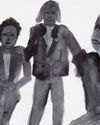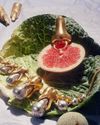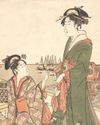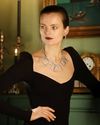Decoding the many faces of Doona Bae.

WHEN IT COMES to unconventional roles, Doona Bae has played a baker’s dozen, whether it’s her debut role as the South Korean version of the infamous killer ghost Sadako in “The Ring Virus”, or a vengeful archer in Bong Joon-ho’s “The Host”, or a lesbian policewoman in the critically acclaimed Cannes favourite “A Girl at My Door”. The 38-year-old South Korean actress is also a Wachowski favourite, having played one of the key roles in the multi-generational saga “Cloud Atlas”, an almost-unrecognisable turn as a bounty hunter in the space opera “Jupiter Ascending” and led the cast of the short-lived-but-beloved Netflix series “Sense8”.
So, it might come as a surprise to find out that the real-life Doona Bae, unlike her usually spunky appearances in film and television, is more reserved and withdrawn, and almost dream-like in her reticence. She speaks slowly, almost languidly, with the tendency to get lost in thought mid-sentence before returning sheepishly back to Earth.
Most of her responses were non-committal. For example, she expressed a sort of bashfulness when quizzed about her early days as an actress, as though embarrassed about even wanting to act in the first place. “I was scouted on the streets as a model, so I actually started modelling first, and I wasn’t interested in acting,” she says. “When I was young, about five or six, my mum was a theatre actress and I grew up watching her plays.”
Being around her mother, veteran stage actress Kim Hwa Young, meant being around other professional actors, and instead of inspiring young Bae into a life of dramatic expression, it had the opposite effect. “They were too big, you know?” she says, with a small laugh. “It was like, they were born to be great actors and I was too shy and I didn’t dare to dream of being an actor.”
This story is from the June 2018 edition of T Singapore: The New York Times Style Magazine.
Start your 7-day Magzter GOLD free trial to access thousands of curated premium stories, and 9,000+ magazines and newspapers.
Already a subscriber ? Sign In
This story is from the June 2018 edition of T Singapore: The New York Times Style Magazine.
Start your 7-day Magzter GOLD free trial to access thousands of curated premium stories, and 9,000+ magazines and newspapers.
Already a subscriber? Sign In

Look At Us
As public memorials face a public reckoning, there’s still too little thought paid to how women are represented — as bodies and as selves.

Two New Jewellery Collections Find Their Inspiration In The Human Anatomy
Two new jewellery collections find their inspiration in the human anatomy.

She For She
We speak to three women in Singapore who are trying to improve the lives of women — and all other gender identities — through their work.
Over The Rainbow
How the bright colours and lively prints created by illustrator Donald Robertson brought the latest Weekend Max Mara Flutterflies capsule collection to life.

What Is Love?
The artist Hank Willis Thomas discusses his partnership with the Japanese fashion label Sacai and the idea of fashion in the context of the art world.

The Luxury Hotel For New Mums
Singapore’s first luxury confinement facility, Kai Suites, aims to provide much more than plush beds and 24-hour infant care: It wants to help mothers with their mental and emotional wellbeing as well.

Who Gets To Eat?
As recent food movements have focused on buying local or organic, a deeper and different conversation is happening among America’s food activists: one that demands not just better meals for everyone but a dismantling of the structures that have failed to nourish us all along.

Reimagining The Future Of Fashion
What do women want from their clothes and accessories, and does luxury still have a place in this post-pandemic era? The iconic designer Alber Elbaz thinks he has the answers with his new label, AZ Factory.

A Holiday At Home
Once seen as the less exciting alternative to an exotic destination holiday, the staycation takes on new importance.
All Dressed Up, Nowhere To Go
Chinese supermodel He Sui talks about the unseen pressures of being an international star, being a trailblazer for East Asian models in the fashion world, and why, at the end of the day, she is content with being known as just a regular girl from Wenzhou.